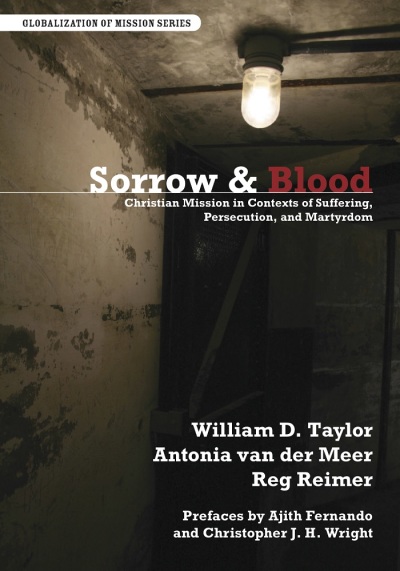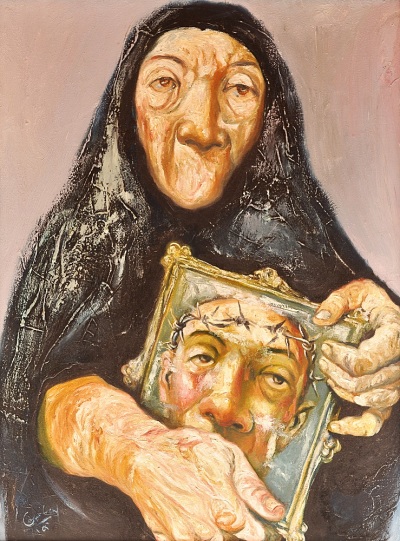'Sorrow & Blood': Resource Anthology Chronicles Centuries of Christian Suffering, Persecution and Martyrdom
I appreciate what Reimer says: "Yes, the question of theodicy seems to attach to all the hardest issues of Christianity. The problem of why a loving God allows suffering, even the cruel deaths of people who choose to remain faithful to him, is on the extreme edge of that question. Quick and trite answers won't do, and I won't give one now".
We also addressed the global heresy of prosperity theology from different perspectives, and the horror of the Rwandan genocide.
CP: Of the many persecution stories featured in Sorrow & Blood, which one stands out for you the most?

Taylor: This is impossible to answer! Throughout the book you find a series of real-life, current-time persecution and cost-of-discipleship stories written by Miriam Adeney. They are all powerful. I love Isaiah Dau's comparative chapter. I am moved by the stories of Eugene Bakhmutsky and the two Iranian sisters in Christ, Maryam Rostampour and Marzieh Amirizadeh. I weep as I re-read David Thompson's personal narrative as a son of Viet Nam martyrs. I worship the living God who calls us to suffering discipleship.
Reimer writes, "As a missionary to Asia I have found counties there seem to have finessed cruelty in killing Christians. I know that this is so for tens of thousands of Vietnamese Catholic martyrs in previous centuries. In our book I find Chuang Chua's account of the twenty-six Japanese martyrs of Nagasaki quite remarkable. And his observation that, 'The paradox of martyrdom is that it unwittingly gives the seemingly powerless church a voice to bear the message of faith and salvation to the very people that seek to silence it.'"
You just have to read the book yourself!
CP: What should the Christian response be to the persecution stories in Sorrow & Blood? What can people do to help those in suffering?
Taylor: We deal with this issue in a series of chapters: Chris Seiple in "Reflections on Theology, Strategy, and Engagement" and Reg Reimer in "Advocating for the Persecuted". Reimer says, "We worked hard on answering that question in the book. The first thing is to reflect deeply on what you read. We encourage that process by the carefully formulated "questions for reflection" at the end of most chapters. We included full resources in the book to point earnest readers to organizations that serve persecuted and suffering Christians by advocacy and direct aid and in other ways.
The huge surge in Christian persecution in the Middle East and North Africa since we published this book only a year ago underlines its prophetic importance. We hope and pray it will awaken at least Western Christians to the phenomenon which is almost entirely ignored by the secular media and our governments."
One case in point: we estimate that about a third of Syria's Christians have been forced to leave their country. Countless numbers of them are refugees in surrounding nations, and many have come to the West to re-settle and re-shape their lives. They need sensitive and sacrificial counsel and assistance where they are now (urgent and immediate care), and gracious wisdom and provision where they will finally settle, either back home or in another nation.
Above all we call fellow-believers to thoughtful and engaged prayer (http://www.persecution.com/idop). See the chapter in the book that gives an example of prayer service for the persecuted church. Mindy Belz and Faith J. H. McDonnell address what we learn and can do in the face of suffering sisters and brothers.
CP: Does an overt focus in Western churches on issues such as abortion and gay marriage stand in the way of focusing greater attention on Christian persecution in oppressive corners of the world?
Taylor: No. Serious Christians in each culture and nation must grapple with the issues of their world; but all must be sensitive to the seductive power of the evil one who wants to distract us from the main issues of God, Jesus, the Spirit, life and death, mission, compassion, justice, creation and Gospel.
And if we are to be fully "life-engaged" we must critique how that unholy triad of world, flesh and Devil seeks to neutralize, seduce, attack, maim and kill. If we are to be faithful to the life and teachings of Christ, then we are called to an integral commitment to the transforming Gospel of Jesus.
CP: Should Western secularization or Christian persecution be the biggest worry for the Church?
Taylor: Both are enemies of Christ and his devoted followers. Satan uses different systems and approaches, depending on the nature of his control. In contexts where a phalanx of oppositions and systems line up against Christians, such as the convergence of politics, religions, military, security apparatus, culture, education, family, then the attacks are much more open. This is the case in nations dominated by a major non-Christian religion-whether Islamic (Muslim world), Hindu (India), Buddhist (Sri Lanka) or animist (Bolivia).
Sometimes compassion for one social issue can help people understand others. The issues at hand are certainly not mutually exclusive, are they? In the Global North, the West, the enemies of the Gospel work with greater subtlety and seduction, undermining the Christian faith through attacks on the mind, on values, on convictions. Increasingly – and we deal with this in the book – the West battles with three diverse adversaries: militant religious pluralism, the religion of fundamentalist secular humanism and seductive materialism.

CP: What is the special role of Christian organizations and Christian human rights groups in the fight against persecution?
Taylor: Reg Reimer fully develops our responses in his chapter in the book, and wrote this week: "These are two very different questions. It seems presumptuous to me to tell mature Christians what their response should be. But only hearts of stone will remain unmoved in some way by the stories of faithfulness in suffering, even unto death – both from centuries past and today!
On what can people do? We worked hard on answering that question in the book. The first thing is to reflect deeply on what you read. We encourage that process by the carefully formulated "questions for reflection" at the end of most chapters. We included full resources in the book to point earnest readers to organizations that serve persecuted and suffering Christians by advocacy and direct aid and in other ways.
These organizations and human rights groups "…are designed to inform their constituents, and advocate for and help the oppressed and persecuted. I think the time has come that they should also aim at influencing public opinion and our governments.
The secular media is almost totally oblivious to historic phenomenon taking place today. As we speak, we are witnessing the eradication by persecution of centuries-old Christian churches in the countries of Christianity's early development. Syria is just one example. Currently, while our churches agencies are beginning to serve refugees from such conflicts, the desperate situation of Christians among them is scarcely on our church's radar, let alone our government's!"
CP: Any final thoughts?
Taylor: Reimer says it so well, "All of us, but especially those vulnerable to direct oppression and persecution, must live our lives between advocacy and readiness to suffer. It's a most helpful phrase that I borrow from Christof Sauer, one of our writers. One never stops advocating for justice when one can, but most Christians in history have had only the choice of endurance in the face of suffering. Some can flee. Some can fight for justice, but most endure suffering. Enduring is not merely a passive stance, but a spiritual discipline described beautifully in the letters of Peter and Paul."
Websites offering further information:
- http://www.worldevangelicals.org/commissions/rlc/
- http://www.idop.org
- http://members.opendoorsusa.org/worldwatchlist/downloads/WorldWatchList2011.pdf
- http://www.globalreligiousfutures.org (Pew Forum)
- http://www.persecution.net (Voice of Martyrs)
- https://www.google.com/search?client=safari&rls=en&q=Reliigous+liberty+christians&ie=UTF-8&oe=UTF-8
For more book information, see http://www.sorrowandblood.com.
The print version can be purchased at William Carey Library https://missionbooks.org/products/detail/sorrow-blood.
The Kindle version at http://www.amazon.com/Sorrow-Blood-William-Taylor-ebook/dp/B00F9BPNHK/ref=sr_1_1?ie=UTF8&qid=1383063504&sr=8-1&keywords=sorrow+and+blood+kindle+edition





















